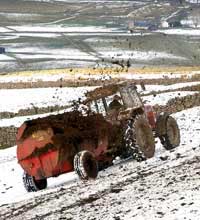Big Freeze: Slurry and milk spreading rules relaxed

Regulations surrounding slurry and milk spreading are being temporarily relaxed to help farmers affected by the big freeze.
The Environment Agency said it would be taking a “more flexible approach” to milk muckspreading after snow and icy conditions left farmers struggling to dispose of waste.
Usual Agency rules mean milk and slurry cannot be spread on frozen ground because of the risk of water pollution.
The regulations meant many farmers have been nearing slurry capacity, while others have been forced to stockpile milk after tankers were unable to make their usual collections because of treacherous driving conditions.
But with the big freeze set to continue for the rest of the week, the Agency said it would allow those nearing capacity to spread waste milk or slurry on snow-covered or frozen soil without fear of breaching waste regulations.
The relaxed rules will only apply until milk collections returned to normal.
David Jordan, agency director of operations, said the agency wanted to help farmers while still protecting the environment.
“Most farmers should have enough storage space to cope through the winter, but any farmer who is facing slurry or surplus milk storage problems should call us,” he said.
An agency spokeswoman said detailed guidance had been published on the agency’s website, including advice on how to reduce slurry by keeping animals on straw and washing dairy parlours with low volume hoses.
“If farmers aren’t sure about what to do, they should ring us for bespoke guidance,” she added. “We know farmers need support and we hope this is a practical solution for them.
“We wouldn’t want this happening regularly, but we don’t want farmers’ tanks overflowing.”
• Farmers who are facing storage difficulties – or want advice on dealing with slurry and surplus milk supplies – are urged to contact their local Environment Agency office for guidance or call the Agency’s helpline on 08708 506506.
The Environment Agency will not take enforcement action when:• action has to be taken to prevent storage overflowing • there is no alternative temporary storage available – such as at a neighbour’s farm – and there are no other environmentally acceptable options for disposal • the activity is unlikely to result in pollution |
